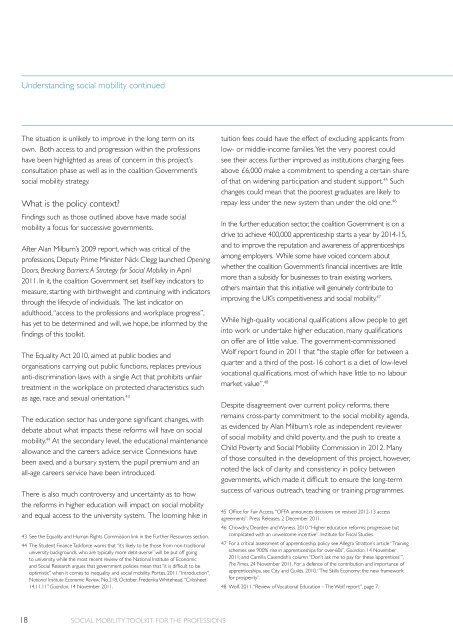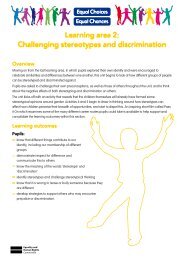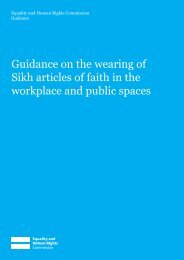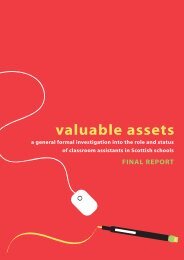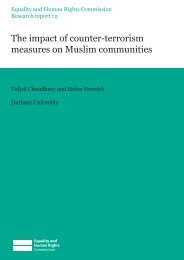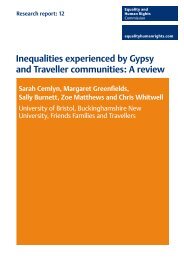Social Mobility Toolkit for the Professions - Equality and Human ...
Social Mobility Toolkit for the Professions - Equality and Human ...
Social Mobility Toolkit for the Professions - Equality and Human ...
You also want an ePaper? Increase the reach of your titles
YUMPU automatically turns print PDFs into web optimized ePapers that Google loves.
Underst<strong>and</strong>ing social mobility continued<br />
<strong>the</strong> situation is unlikely to improve in <strong>the</strong> long term on its<br />
own. both access to <strong>and</strong> progression within <strong>the</strong> professions<br />
have been highlighted as areas of concern in this project’s<br />
consultation phase as well as in <strong>the</strong> coalition Government’s<br />
social mobility strategy.<br />
What is <strong>the</strong> policy context?<br />
Findings such as those outlined above have made social<br />
mobility a focus <strong>for</strong> successive governments.<br />
after alan Milburn’s 2009 report, which was critical of <strong>the</strong><br />
professions, Deputy prime Minister nick clegg launched Opening<br />
Doors, Breaking Barriers: A Strategy <strong>for</strong> <strong>Social</strong> <strong>Mobility</strong> in april<br />
2011. in it, <strong>the</strong> coalition Government set itself key indicators to<br />
measure, starting with birthweight <strong>and</strong> continuing with indicators<br />
through <strong>the</strong> lifecycle of individuals. <strong>the</strong> last indicator on<br />
adulthood, “access to <strong>the</strong> professions <strong>and</strong> workplace progress”,<br />
has yet to be determined <strong>and</strong> will, we hope, be in<strong>for</strong>med by <strong>the</strong><br />
findings of this toolkit.<br />
<strong>the</strong> equality act 2010, aimed at public bodies <strong>and</strong><br />
organisations carrying out public functions, replaces previous<br />
anti-discrimination laws with a single act that prohibits unfair<br />
treatment in <strong>the</strong> workplace on protected characteristics such<br />
as age, race <strong>and</strong> sexual orientation. 43<br />
<strong>the</strong> education sector has undergone significant changes, with<br />
debate about what impacts <strong>the</strong>se re<strong>for</strong>ms will have on social<br />
mobility. 44 at <strong>the</strong> secondary level, <strong>the</strong> educational maintenance<br />
allowance <strong>and</strong> <strong>the</strong> careers advice service connexions have<br />
been axed, <strong>and</strong> a bursary system, <strong>the</strong> pupil premium <strong>and</strong> an<br />
all-age careers service have been introduced.<br />
<strong>the</strong>re is also much controversy <strong>and</strong> uncertainty as to how<br />
<strong>the</strong> re<strong>for</strong>ms in higher education will impact on social mobility<br />
<strong>and</strong> equal access to <strong>the</strong> university system. <strong>the</strong> looming hike in<br />
43 See <strong>the</strong> equality <strong>and</strong> human rights commission link in <strong>the</strong> Fur<strong>the</strong>r resources section.<br />
44 <strong>the</strong> Student Finance task<strong>for</strong>ce warns that “it’s likely to be those from non-traditional<br />
university backgrounds, who are typically more debt-averse” will be put off going<br />
to university, while <strong>the</strong> most recent review of <strong>the</strong> national institute of economic<br />
<strong>and</strong> <strong>Social</strong> research argues that government policies mean that “it is difficult to be<br />
optimistic” when it comes to inequality <strong>and</strong> social mobility. portes. 2011. “introduction”.<br />
national Institute Economic Review, no.218, october. Frederika Whitehead. “cribsheet<br />
14.11.11” Guardian, 14 november 2011.<br />
18 <strong>Social</strong> <strong>Mobility</strong> toolkit For <strong>the</strong> proFeSSionS<br />
tuition fees could have <strong>the</strong> effect of excluding applicants from<br />
low- or middle-income families. yet <strong>the</strong> very poorest could<br />
see <strong>the</strong>ir access fur<strong>the</strong>r improved as institutions charging fees<br />
above £6,000 make a commitment to spending a certain share<br />
of that on widening participation <strong>and</strong> student support. 45 Such<br />
changes could mean that <strong>the</strong> poorest graduates are likely to<br />
repay less under <strong>the</strong> new system than under <strong>the</strong> old one. 46<br />
in <strong>the</strong> fur<strong>the</strong>r education sector, <strong>the</strong> coalition Government is on a<br />
drive to achieve 400,000 apprenticeship starts a year by 2014-15,<br />
<strong>and</strong> to improve <strong>the</strong> reputation <strong>and</strong> awareness of apprenticeships<br />
among employers. While some have voiced concern about<br />
whe<strong>the</strong>r <strong>the</strong> coalition Government’s financial incentives are little<br />
more than a subsidy <strong>for</strong> businesses to train existing workers,<br />
o<strong>the</strong>rs maintain that this initiative will genuinely contribute to<br />
improving <strong>the</strong> Uk’s competitiveness <strong>and</strong> social mobility. 47<br />
While high-quality vocational qualifications allow people to get<br />
into work or undertake higher education, many qualifications<br />
on offer are of little value. <strong>the</strong> government-commissioned<br />
Wolf report found in 2011 that "<strong>the</strong> staple offer <strong>for</strong> between a<br />
quarter <strong>and</strong> a third of <strong>the</strong> post-16 cohort is a diet of low-level<br />
vocational qualifications, most of which have little to no labour<br />
market value”. 48<br />
Despite disagreement over current policy re<strong>for</strong>ms, <strong>the</strong>re<br />
remains cross-party commitment to <strong>the</strong> social mobility agenda,<br />
as evidenced by alan Milburn’s role as independent reviewer<br />
of social mobility <strong>and</strong> child poverty, <strong>and</strong> <strong>the</strong> push to create a<br />
child poverty <strong>and</strong> <strong>Social</strong> <strong>Mobility</strong> commission in 2012. Many<br />
of those consulted in <strong>the</strong> development of this project, however,<br />
noted <strong>the</strong> lack of clarity <strong>and</strong> consistency in policy between<br />
governments, which made it difficult to ensure <strong>the</strong> long-term<br />
success of various outreach, teaching or training programmes.<br />
45 office <strong>for</strong> Fair access. “oFFa announces decisions on revised 2012-13 access<br />
agreements”. press releases, 2 December 2011.<br />
46 chowdry, Dearden <strong>and</strong> Wyness. 2010. “higher education re<strong>for</strong>ms: progressive but<br />
complicated with an unwelcome incentive”. institute <strong>for</strong> Fiscal Studies.<br />
47 For a critical assessment of apprenticeship policy see allegra Stratton’s article “training<br />
schemes see 900% rise in apprenticeships <strong>for</strong> over-60s”, Guardian, 14 november<br />
2011; <strong>and</strong> camilla cavendish’s column “Don’t ask me to pay <strong>for</strong> <strong>the</strong>se ‘apprentices’”,<br />
The Times, 24 november 2011. For a defence of <strong>the</strong> contribution <strong>and</strong> importance of<br />
apprenticeships, see city <strong>and</strong> Guilds. 2010. “<strong>the</strong> Skills economy: <strong>the</strong> new framework<br />
<strong>for</strong> prosperity”.<br />
48 Wolf. 2011. “review of Vocational education – <strong>the</strong> Wolf report”, page 7.


